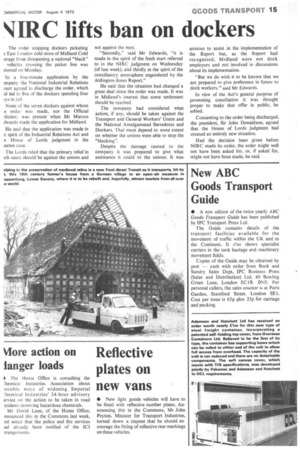■ T R C lifts ban on dockers
Page 17

If you've noticed an error in this article please click here to report it so we can fix it.
The order stopping dockers picketing a East London cold store of Midland Cold orage from threatening a national "black" vehicles crossing the picket line was moved on Monday.
In a five-minute application by the )mpany the National Industrial Relations ourt agreed to discharge the order, which id led to five of the dockers spending four tys in jail.
None of the seven dockers against whom e order was made, nor the Official )licitor, was present when Mr Marcus dwards made the application for Midland.
He said that the application was made in e spirit of the Industrial Relations Act and e House of Lords judgment in the eaton case.
The Lords ruled that the primary relief in tch cases should be against the unions and not against the men.
"Secondly," said Mr Edwards, "it is made in the spirit of the fresh start referred to in the NIRC judgment on Wednesday (of last week), and thirdly M the spirit of the conciliatory atmosphere engendered by the Aldington-Jones Report."
He said that the situation had changed a great deal since the order was made. It was in Midland's interest that some settlement should be reached.
The company had considered what action, if any, should be taken against the Transport and General Workers' Union and the National Amalgamated Stevedores and Dockers. That must depend to some extent on whether the unions were able to stop the "blacking".
Despite the damage caused to the company it was prepared to give what assistance it could to the unions. It was anxious to assist in the implementation of the Report but, as the Report had recognized, Midland were not dock employers and not involved in discussions about its implementation.
"But we do wish it to be known that we are prepared to give preference in future to dock workers." said Mr Edwards.
In view of the Act's general purpose of promoting conciliation it was thought proper to make that offer in public, he added.
Consenting to the order being discharged, the president, Sir John Donaldson, agreed that the House of Lords judgment had created an entirely new situation.
Had the decision been given before NIRC made its order, the order might well not have been asked for, or, if asked for, might not have been made, he said. .








































































































